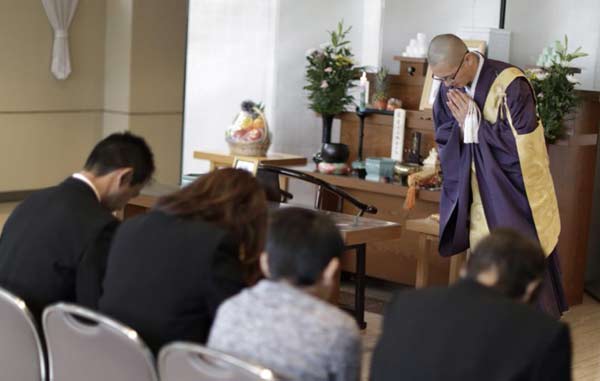(单词翻译:单击)
In Japan, where communal ties to local Buddhist temples are fading, families have in recent years been able to go online to find a Buddhist monk to perform funerals and other rituals.
在日本,公众与本地佛教寺庙之间的联系不断淡化。近几年,很多家庭开始通过网络找佛教僧人来主持葬礼或其他仪式。
But when Amazon Japan allowed a provider to offer "Obo-san bin," or "Mr. Monk Delivery," on its website, it shone a spotlight on the emerging trend and prompted a major Buddhist organization to criticize the Internet marketer of commercializing religion.
日本亚马逊在其网站允许供应商提供“僧人配送”,这一行为虽然得到了很多关注,但同时互联网经销商也因将宗教商品化而受到佛教团体的批评。

A basic plan for monk, transportation and a donation offered by the Tokyo-based provider, Minrevi Co., one of dozens of emerging budget companies, costs 35,000 yen ($300). Three other options are available for more money. The monks would typically go to a home, funeral hall or a grave to perform the requested ceremony.
请一位僧人的基本价格是3.5万日元(约合300美元),包括交通费和捐赠费,这是东京一家新兴的廉价公司——敏雷维公司所给出的报价。若你需要额外的三项服务,则需另付费用,比如请僧人到家中、灵堂或坟墓去主持仪式。
"Such a thing is allowed in no other country in the world. In this regard, we must say we are disappointed by an attitude toward religion by Amazon," Akisato Saito, director of the Japan Buddhist Association, said in a statement.
“世界上其他国家是不会允许这种事情发生的。在这一点上,我必须说,亚马逊对待宗教的态度让我们很是失望。”日本佛教协会理事长斋藤明圣(Akisato Saito)在一份声明中说道。
Many Japanese, however, welcome the service as a consumer-friendly approach to Buddhist rituals, whose cost is often perceived as murky and overpriced. Buddhist-style memorial services offered by temples comparable to the "monk delivery" could cost as 100,000 yen ($830). Funerals are even more expensive and can cost well over 1 million yen ($8,500).
然而,很多日本人却很欢迎这项服务。他们觉得这样服务更便于他们寻找僧人来办仪式。而且传统的佛教仪式往往价格不透明并且高昂。与“僧人配送”相比,传统寺庙提供的追悼会费用大约10万日元(约合830美元)。葬礼费用则更高,甚至会超过100万日元(约合8500美元)。
Monk delivery services have emerged as many of Japan's 75,000 temples are losing offerings and business with hereditary members in their communities which traditionally have been the main source of financial support. That is threatening the survival of many temples in rural areas. In fact, some experts predict that the majority of Japanese temples without income from tourism and other businesses are expected to close over the next several decades.
日本7.5万间寺庙正在逐渐失去市场,世袭僧人也在逐渐失去他们在社区内的业务,这些业务是他们的主要经济来源。这时,僧人配送服务随之而生。这对很多郊区的寺庙造成了威胁。事实上,一些专家预测,在接下来的几十年,大部分无法从旅游业或其他产业中获得经济来源的日本寺庙会关闭。
Minrevi spokesman Jumpei Masano says the service seems to attract those who want to have Buddhist funerals but are uneasy about pricing system, and want to keep their distance from temples.
敏雷维公司发言人正野顺平(Jumpei Masano)称,这项服务可能会吸引那些想办佛教葬礼却又担心价格太贵的人,或者是那些想要与寺庙保持一定距离的人。
"Many people don't have ties with temples and they have no idea where and how to arrange Buddhist rituals, while monks are increasingly concerned about their declining temple membership," Masano said. "We can cater to the needs on both sides and hopefully we can bring them together."
“很多人与寺庙并没有联系,并且他们也不知道要在哪、如何举办佛教葬礼,而僧人们则是因其不断减少的信徒而忧心不止,” 正野顺平说道,“我们可以同时满足两边的需求,并且希望能将他们联系在一起。”
Some monks acknowledge that the growing business highlight the Buddhist temples' complacency and their failure to reach out and adapt to the people's needs.
一些僧人承认,这项业务的市场需求不断增长反映出佛教寺庙的自满,他们无法适应民众的需求。
"We do understand there are criticisms of us as well and we take them seriously. And we must ask ourselves if and how we can change," said Hanyu Kakubo, public relations secretary for the Japan Buddhist Association.
日本佛教协会公关秘书鹿洼赤生(Hanyu Kakubo)说:“我们理解也十分重视外界对我们的批判,同时,我们也必须扪心自问,是否可以做出改变,又将如何改变。”
When Yutaka Uematsu's 17-year-old son Kakeru died just over a month ago after battling cancer, he searched on the Internet for a funeral service provider.
一个月前,由隆上松裕(Yutaka Uematsu)17岁的儿子Kakeru因癌症去世,他在网上订了葬礼服务。
Uematsu didn't consider asking his father's family temple as he had heard the prices charged for a family member's funeral were "outrageous."
上松裕没有考虑他父亲的宗祠,因为他听说其价格贵的离谱。
So he and his wife went to the Minrevi website and picked for their son a package at a price less than half or even cheaper than an average, conventional service.
因此,他和妻子便在网上搜索到了敏雷维,并为儿子订购了一整套传统葬礼仪式,价格比传统寺庙便宜了一半多。
"Honestly, the cost was my biggest concern," Uematsu said. "I liked its price system that was simple and clear."
上松裕说:“说实话,价格是我最担心的事情。我喜欢他们的价格系统,简单易懂。”
At first, he was worried about the quality of the service he might get, but that wasn't a problem. A 24-hour customer service line was also helpful for the couple emotionally devastated by the loss of their son. While it didn't offer counseling services, representatives could be reached regarding funeral details at any time, helping them feel more at ease during a painful time. Uematsu also arranged the traditional 49th-day posthumous ritual for his son using the same service.
一开始,他也很担心服务的质量,但后来发现这并不是问题。敏雷维公司的24小时客户服务热线对这对刚失去儿子而悲痛欲绝的夫妇来说起了很大的帮助作用。虽然该公司并不提供心理疏导服务,但客户可随时联系经销商了解葬礼细节,这让他们在失去亲人痛苦之余也得到些许安慰。上松裕还用了敏雷维公司的服务为儿子举办了死后第49天的纪念仪式。
Amazon declined to comment, saying it's only renting the space to Minrevi to promote the service, which offers only for monk delivery and a separate 20,000-yen ($170) charge for a posthumous Buddhist title, not funeral packages.
亚马逊对此拒绝对此事作出评价,称他们只是给敏雷维公司提供一个平台来推行这项服务。只是对僧人配送进行报价和收取额外的亡后取法名服务费2万日元(约合170美元),而不是针对一整套葬礼仪式。
Minrevi, whose orders for the monk delivery service has tripled over the past five years, said Internet-based inquiries and phone calls surged after it placed the service on Amazon. More surprisingly, some 100 monks came forward to register for the delivery service. The company already has contracts with 400 monks nationwide, said Masano, the spokesman.
5年来,敏雷维公司所接的僧人配送服务订单翻了三倍,尤其是在亚马逊上推出这项服务后,网上咨询和电话预定的数量激增。更令人惊讶的是,一开始就有大约100名僧人来注册报名这项服务。敏雷维公司发言人正野顺平称,现在公司已经在全国范围内与400名僧人签订了合同。
Kaichi Watanabe, the 40-year-old monk dispatched to a memorial ceremony for the Uematsu family recently, said he had been looking ways to perform rituals to earn a living and meet more people to share Buddha's teachings.
40岁的僧人垣内渡边(Kaichi Watanabe)最近被派遣到上松裕家中主持葬礼。他说他一直不断寻找主持仪式的机会,以此来维持生计,并与更多人一同分享佛教的教导。
His elder brother had succeeded the temple founded by their grandfather, also a monk, in Fukushima prefecture, so Watanabe had to go elsewhere. About a year ago, he found Minrevi and signed a contract.
他的哥哥也是一名僧人,继承了祖父在福岛县的寺庙,所以他必须另觅他处。大概一年前,他找到了敏雷维并和他们签订了合约。
"Today, nobody comes to temples asking for us to perform funerals for their parents," Watanabe said in an interview before the service, at which he chanted in front of an altar decorated with chrysanthemum flowers and Kakeru's photo in a black frame. "I'm hoping that a service like this, a brainchild of the Internet age, could make Buddhist temples a more approachable place for everyone."
渡边站在布满菊花的灵台和黑色相框里儿子的照片前进行吟唱。在仪式开始前,渡边接受采访说,“如今,没有人会到寺庙来找我们主持他们父母的葬礼,我希望通过像这样的服务,这个网络时代的产物,能够让寺庙变得更加大众化。”
"There is no point being a monk," he said, "if we can't offer a helping hand when someone needs us."
他说:“如果在别人需要的时候我们不能给予他们帮助,那么做一个僧人也就没有任何意义了。”


